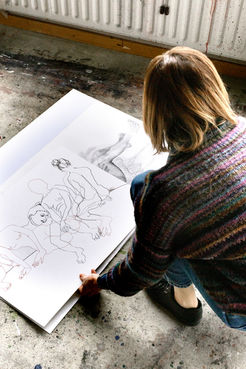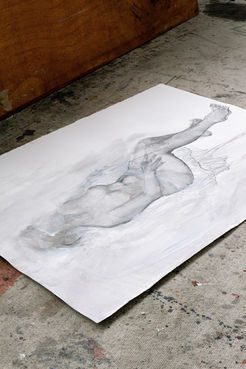faux pas - nudes.
The faux pas goes by many names - gaffe, breach of etiquette, gaucherie, peccadillo - but whatever you want to call it, hardly anything causes as much immediate embarrassment and deferred hilarity as a socially awkward or improper act or remark.
© Roland Herrmann

Anna mit Büstenhalter
Aquarell, Tusche auf Papier, 30 x 40cm

Akt unbekannt gelb
Aquarell, Tusche auf Papier, 42x42cm

Anna rot
Aquarell, Tusche auf Papier, 30x40cm
The French phrase "faux pas" has been in use in English since the late seventeenth century. Etymologically the expression referred to a "false dance step" - and taking a false step in the highly choreographed and minutely timed dances of the period would certainly have caused many an eyebrow to rise in derision. Today, however, the phrase can be used in a much wider range of contexts and when we say that someone has made a faux pas, we simply mean that they have made
"a social or cultural blunder."
© Roland Herrmann

Faux Pas
Dessin digitalisé, Edition en 10 exemplaires, 42 x 62 cm
faux pas.

Trauernde Frauen
Fine Liner, Tusche auf Papier

Eva im Hintergrund
Tusche, Aquarell, weiße Farbe auf Papier
75 x 106 cm
According to Jacques Lacan, the faux pas can also be seen within the context of paedopsychological development and the integration of the 'Name-of-the-Father.' Lacan's concept of the 'Name-of-the-Father' denotes the laws and restrictions that control your desire and simultaneously delineate the social dictates and conventions that permit you to enter language and social interaction. Only through acceptance of the 'Name-of-the-Father' are you able to enter into a community of others and actualize your social self.
In this view, the faux pas is closely related to the Freudian slip, in which the superego's acceptance of the dictates imposed by the 'Name-of-the-Father' is spontaneously undermined by unconscious impulses that ultimately might reveal your true but socially
"unacceptable desires and motives."
© Roland Herrmann

Gelber Rücken mit Tropfen
Aquarell, Bleistift auf Papier
60 x 80 cm

Alte Frau
Aquarell, Tusche auf Papier
60 x 80 cm

Schwangere Frau
Tusche auf Papier
60 x 80 cm

Hängender Akt
Tusche auf Papier
60 x 80 cm
"Hence, the danger of committing a faux pas underscores the importance of learning about culturally acceptable norms of behaviour. A lack of this cultural awareness may cause offense, destroy relationships or even ruin careers."
© Roland Herrmann

Liegender Akt
Aquarell, Tusche auf Papier, 43 x 64cm
"If we all rigidly followed the well-trodden path, we might indeed never fall off the cliff, but neither would we discover the hidden beauty in the terra incognita."
© Roland Herrmann

Alex
Tusche auf Papier, 43 x 53 cm

Mann
Tusche auf Millimeterpapier, 52 x 52 cm





